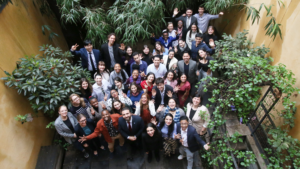Today at the UN I was able to attend a side event hosted by the Holy See. My first surprise was seeing how many people showed up. We filled up Conference Room 2, which has largely been used for the main sessions of the Commission on the Status of Women. Side events usually take place in smaller rooms with less seating capacity. My second surprise was that about half of the participants were young people.
There were four panelists who each gave presentations on caregiving and the family- a topic that has been one of the focuses of the Commission. One panelist was a woman from the Congo who spoke about caregiving in the context of areas affected by HIV/AIDS. The way these topics were discussed capitalized on the positive conclusions made thus far at the CSW, but it also threw a whole new light on the issues that the CSW has been dealing with. The concept of “dependency” was described as a universal human condition completely compatible with human dignity. When those in particularly dependent situations are seen as burdens, there is an enormous risk that their dignity will not be recognized. Emphasis was made on the importance of being able to receive care as well as give it, and caregiving was viewed not as a burden, but rather as a responsibility that can bring tremendous joy. Caregiving and care-receiving, when viewed in this light, have the tremendous capacity to enlarge the potential of the human person.
There is a problem however, with the way many cultures value work. Most social structures leave those who are primary caregivers without any economic protection or compensation. In this way, society discourages caregiving by leaving caregivers entirely vulnerable financially. This problem tends to affect women more than men. One speaker pointed out that in developed countries, many single mothers who have the double responsibility of providing care and funding for their households will often hire women from less developed countries to care for their children- and in turn, take these women away from their families.
Panelists encouraged men to take a greater responsibility in providing care within the family. They encouraged governments to provide compensation for caregivers and restructure the financial sector to allow that people be cared for by those closest to them. Examples of this included the parental leave (maternal and paternal) offered in many Scandinavian countries, micro-financing for home-based businesses that allow women more flexibility, and health care programs that allow families to care for elderly members. Overall, measures were offered that were both very practical and in line with human dignity, and which supported the family as the first school of humanity.
Marie Murray – World Youth Alliance, United States







